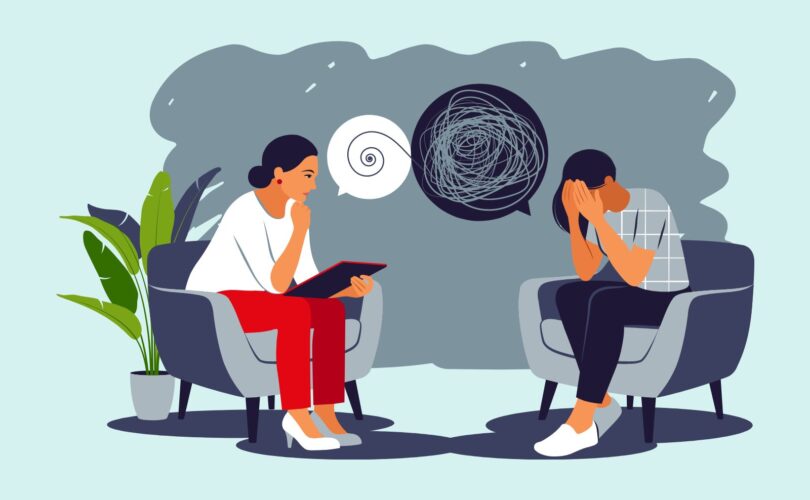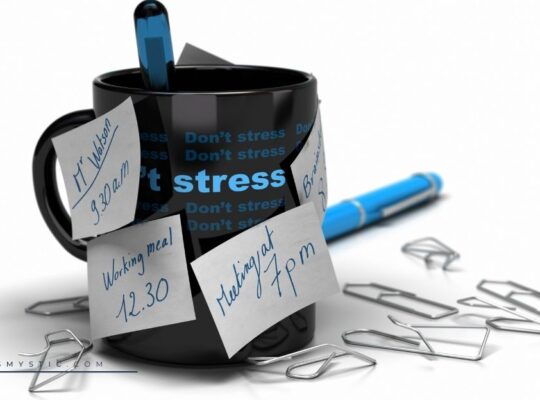What Is Psychological Stress
Psychological stress refers to the psychological and physiological response to a perceived threat or challenge to one’s well-being. It is a natural response that prepares the body to take action in the face of a perceived danger or threat, also known as the “fight or flight” response.
According to experts at Verywell Health, psychological stress can be caused by a wide range of events or situations, including work pressure, financial problems, relationship difficulties, traumatic experiences, and major life changes.
It can also be chronic and caused by situations that aren’t likely to change anytime quickly, such as ongoing stress from a demanding job or challenging family situation. In other situations, psychological stress can form quickly and “in the moment,” such as suddenly finding yourself in an unexpected argument or right before taking a huge final exam for a course.
Prolonged psychological stress can have negative effects on both mental and physical health, including anxiety, depression, fatigue, digestive problems, and heart disease.
While experiencing psychological stress is normal and all people will experience it from time to time, it is important to learn how to identify and manage it properly for your overall wellbeing.
15 Signs Of Psychological Distress
There are a few common ways psychological stress presents itself among human beings. The Mayo Clinic describes these signs as falling under three main categories: mental, physical, and emotional. Some of the mental signs include…
Mental Signs
1| An inability to focus or concentrate.
When you are experiencing psychological distress, your body activates a “fight or flight” response that makes you either want to combat the issue head-on or flee from it.
Being caught in this “fight or flight” response is thought-consuming. When you are so absorbed with thinking about your stressor, it is difficult to focus or concentrate on anything else. This can make getting tasks at work completed, enjoying your favorite hobbies, or handling your other responsibilities difficult.
2| A desire to withdraw from social situations.
Going through psychological stress can cause a person to withdraw from social situations. Interacting with people – even the people you love most, such as your family members and friends – requires a lot of your mental energy.
If you are so absorbed in your psychological stressors, the idea of being social with other people may seem wholly unappealing (or even impossible!). Rather than trying to enjoy your time being social, you may feel yourself withdrawing from social situations and avoiding them completely.
3| A desire to use unhealthy coping mechanisms, such as overeating, drinking excessively, or smoking as a method of stress management.
One of the most dangerous mental signs of psychological stress described by the Mayo Clinic is the desire to use unhealthy coping mechanisms as a means of escape or management. If you notice yourself leaning on a coping mechanism that causes more harm than good, it may be a serious sign of psychological stress.
For example, some common unhealthy coping mechanisms include overeating, binge drinking, smoking, and using drugs. While these outlets may help you feel better in the short-term, they cause more serious long-term issues that can create even more psychological stress in the future.
Despite feeling good “in the moment,” these unhealthy coping mechanisms are not effective because they leave you feeling worse than before you engaged in them.
4| A lack of motivation to do anything.
The Mayo Clinic describes another major sign of psychological stress as a lack of motivation to do anything – even the things you love to do or need to do. Because your thoughts are so absorbed in whatever is causing you psychological stress, you lose both energy and interest to do much else. Errands, work tasks, fun with friends, hobbies, and more tend to fall by the wayside when you are experiencing high levels of psychological stress.
Emotional Signs
1| Increased irritability.
Psychological stress can have a significant impact on a person’s mood and behavior, often leading to feeling and acting more irritable. This can be due to several factors, such as hormonal changes triggered by psychological stress, which can alter a person’s mood and make them more irritable. Stress can also disrupt a person’s sleep patterns, causing them to feel tired and fatigued, which can negatively affect their mood and make them more prone to irritable outbursts.
Additionally, stress can trigger feelings of anxiety and worry, which can further contribute to irritability. Difficulty concentrating and making decisions due to stress can also lead to extra frustration and irritability. Finally, physical symptoms such as headaches, muscle tension, and digestive problems caused by stress can be uncomfortable and contribute to a person’s irritability.
2| Worsening issues with depression.
A person already experiencing psychological distress likely experiences depression. According to a 2015 study by Longfei Yang, “Major depressive disorder is a serious mental disorder that profoundly affects an individual’s quality of life. Although the etiologies underlying this disorder remain unclear, an increasing attention has been focused on the influence imposed by psychological stress over depression.”
In short, Yang believes strongly that psychological stress is a huge contributing factor to why so many people experience depression. If you are already feeling depressed, experiencing an increase in psychological stress levels can make it much worse.
3| Angry outbursts that are not justifiable.
Everyone experiences periods of anger – like all other emotions, anger is natural and will happen from time to time for plenty of identifiable reasons.
However, a person experiencing extreme psychological distress may find themselves having angry outbursts with no justifiable reasons behind them. If you notice yourself snapping at loved ones or feeling extremely angry for no reason, it may be due to pressures from psychological stress.
4| Feeling restless.
People struggling with psychological distress may see that struggle show itself through restlessness. Rather than being able to “wind down” and rest or take a break, a person suffering with psychological stress may feel like they have to be busy or “on the move” constantly.
This kind of restlessness can also translate into sleeplessness. Since a person with psychological stress may struggle to relax, going to sleep can feel like an impossibility, causing them to stay awake long into the night.
Physical Signs
1| Body aches.
Experiencing psychological stress can translate into physical body aches and pains. For example, experiencing psychological stress can make a person feel like they are clenching different muscle groups out of anxiety – afterward, they might complain of feeling back pains or leg pain from clenching these muscles so tightly.
2| Fatigue or tiredness.
Experiencing psychological stress takes a toll on a person’s energy levels. Similarly, in #4 of the previous section, psychological stress can also cause a person to become so restless that they cannot get enough good, quality sleep. Because of this, psychological stress can lead to extreme feelings of fatigue or tiredness throughout the day. Eventually, going through a period of time with psychological stress can take long term tolls on a person’s ability to rest and relax, which can lead to an increase in tiredness.
3| Headaches.
Experiencing a headache when you’re also feeling stressed out is not by coincidence. According to the Mayo Clinic, you are more likely to experience headaches or migraines when you are already experiencing a bout of psychological stress.
When you cannot relax or rest, your body remains in “go” mode constantly – in periods of extreme stress, you may be trapped in the “fight, flight, or freeze” reaction constantly, which can lead to extreme tension on the body. This amount of tension can easily trigger bad headaches.
4| Disrupted sleep patterns.
Psychological stress can make resting feel impossible. It isn’t uncommon for people going through periods of considerable psychological stress to struggle with sleeping on their usual schedules.
Even if you are normally a very deep sleeper with a good bedtime routine, you may find these predictable habits and patterns totally disrupted when you are navigating a particularly psychologically stressful time in your life.
5| Loss of interest in sex.
When you are going through a tough, psychologically-stressful period, it can be a challenge to focus on anything except what is causing you to feel stressed and anxious. Many people lose an interest in sex when they are feeling the effects of psychological stress. It may be a huge challenge to focus on anything else – such as your own pleasure or your partner’s desires – and the idea of relaxing enough to enjoy sex can feel impossible.
6| Digestive issues.
Experiencing psychological stress can cause a person to experience problems with their digestive system. For example, feeling excessively stressed can cause a person to totally lose interest in eating – when you are totally distracted by your stress-inducing trigger, no foods may sound particularly appealing and you sense of hunger may temporarily disappear.
Some folks may experience issues with constipation and/or diarrhea when they are going through stressful times. This is because being in “flight, fight, or freeze” mode stops any temporarily “unnecessary” bodily functions (such as digestion) so more blood can be flowed to the extremities to take action. These types of “stop and go” effects on the digestive system can wreak havoc, causing a person to experience waves of constipation, diarrhea, and nausea.
7| Chest pains or chest tightness.
Many people experience stress as chest pain or tightness. Sometimes, people even mistake these stress-induced chest pains as heart attacks. While they are not as serious as a heart attack, psychological stress-induced chest pain can be frightening, uncomfortable, and unhelpful when you are already experiencing high levels of stress.
10 Common Sources Of Psychological Distress And Stressors Of The Mind
The causes of psychological stress can vary depending on an individual’s circumstances, but some of the most common causes of psychological stress might include…
1| Work-related stress.
Work is a huge source of psychological stress for many people. For example, people dealing with difficult supervisors and coworkers, extreme workloads, job security, and toxic workplace environments may feel excessive amounts of psychological stress concerning their careers.
2| Financial stress.
Finances are another huge source of psychological stress. Whether a person is facing unemployment, depleted savings accounts, unexpected expenses, and beyond, any of life’s issues pertaining to finances can be difficult to navigate and extremely stress-inducing. Finances tend to touch all aspects of a person’s
3| Relationship stress.
Arguments with friends, disagreements with family members, divorces, squabbles with neighbors, and more – there are many ways in which people can feel psychological stress from the many different relationships in their lives.
In contrast, people can also experience relationship stress from a lack of contact or communication with others; feeling isolated and lonely can create a new type of psychological stress.
4| Health-related stress.
Short-term and long-term issues with health can lead to a lot of psychological stress. Whether you are tackling major health conditions, a temporary setback from an injury, or chronic issues, the amount of stress you can endure while also trying to manage your health issues can make healing even more challenging.
5| Academic stress.
Many students are familiar with academic stress. Whether they are trying to pass big tests, race for the top spots within their class, or please their parents with high scores, the amount of stress students can feel from their academic lives can be staggering.
6| Major life changes.
All people will experience major changes at some point or another in their lives. Marriages, divorces, the birth of a child, changing careers, moving to a new city, and more can all cause psychological distress – even when the life change the person is experiencing is considered a happy occasion!
7| Traumatic events.
Living through a traumatic event can be a huge source of psychological stress. Some examples of traumatic events include violent crime, abuse, and natural disasters, though there are many types of experiences that can leave a person feeling traumatized afterward.
8| Daily hassles.
All people experience the daily hassles of living. Long commutes, busy stores, excessive noise, minor home repair needs, and more cloud all people’s days with extra hassle. Over time, these daily hassles can lead to excessive psychological stress.
9| Perfectionism and high expectations.
Many people strive for perfection and set high expectations for themselves. However, this drive to live a perfect life and meet all of your own high expectations can be incredibly stress-inducing. Naturally, people want the very best for themselves, but often these high expectations can be unrealistic – and even impossible – to actually achieve, leaving a person feeling very burned out from the psychological stress of trying to meet those expectations.
10| Lack of control or feeling overwhelmed.
Life would be perfect if everyone could have complete and total control over everything happening to them, but this is far from ever being the case. Nobody will ever have complete control over everything in their life, and this lack of total control can be extremely stress-inducing for many. If you struggle to relinquish your control over different aspects of your life, you may experience significant psychological stress from it.
10 Common Side Effects Of Unmanaged Psychological Stress
According to a collection of studies analyzed and conducted by the American Psychological Association, psychological stress is causing some big problems for many people.
”Stress in America continues to escalate and is affecting every aspect of people’s lives — from work to personal relationships to sleep patterns and eating habits, as well as their health,” says psychologist Russ Newman, PhD, JD, APA executive director for professional practice. Because of stress’ prevalence in many people’s lives, understanding the common side effects unmanaged psychological stress can cause is important. Some of these common side effects include…
1| Physical health problems.
Chronic psychological stress can lead to a range of physical health problems, including high blood pressure, heart disease, digestive problems, weakened immune system, and sleep disturbances. Over time, unmanaged psychological stress that is allowed to continue for long periods of time without any sense of management can wreak havoc on the physical body.
2| Emotional problems.
Mismanaged psychological stress can lead to emotional problems such as anxiety, depression, mood swings, irritability, and anger. For example, it can be challenging for people with poorly managed psychological stress to calm themselves enough to explore and properly process their emotions, allowing them all to spiral out of control.
3| Cognitive problems.
Chronic stress can impact cognitive function, including your memory, concentration, and decision-making ability. When you are focusing all of your mental stamina on your psychological stressors, it can feel impossible to concentrate or focus on anything else happening in your life. Similarly, you can struggle to remember different details or make sound decisions when your mental energy is mostly (or completely) focused on your psychological stressors.
4| Relationship problems.
High levels of stress can lead to relationship problems such as communication breakdown, increased conflict, and decreased intimacy. Being too attuned to your psychological stressors can take away from any sort of relationship-building efforts you would normally make because your attention is refocused elsewhere.
5| Work-related problems.
Mismanaged stress can cause decreased productivity, poor decision-making, absenteeism, decreased job satisfaction, and increased turnover. These effects can be detrimental to your work and career.
6| Behavioral problems.
Chronic stress can lead to the use of unhealthy coping mechanisms, such as substance abuse, overeating, and social withdrawal. At the moment, these behavior choices may seem like good methods for averting stress, but in the long term, they can cause serious negative impacts and even more stress.
10 Benefits Of Managing Stress That Affects The Mind
Learning how to manage stress that affects your mind is one of the greatest things you can do for your mental health and overall wellbeing. For example, some notable benefits include…
1| Improved mental health.
Chronic stress can cause anxiety and depression, leading to poor mental health. By managing stress, you can reduce the risk of developing these conditions or improve existing symptoms if you already struggle with them.
2| Enhanced physical health.
Stress, especially ongoing chronic stress, can cause physical health problems such as high blood pressure, heart disease, and gastrointestinal issues. Developing these issues in your lifetime can add to the amount of psychological stress you might already be experiencing. Managing stress can help prevent or reduce the risk of these conditions.
3| Increased resilience.
Learning how to manage stress can help you build resilience and adapt to challenging situations more effectively. This can lead to increased confidence and a greater sense of control over your life. Rather than allowing setbacks and challenges to defeat you and cause even more psychological stress, you learn how to move past them effectively.
4| Better sleep quality.
Stress can make it difficult to fall asleep and stay asleep, leading to poor sleep quality and quantity. By managing stress, you can improve your sleep patterns, leading to better overall mental health and well-being.
5| Improved relationships.
Stress can negatively impact relationships with family, friends, and colleagues. By managing stress, you can improve communication, reduce conflict, and strengthen all the different relationships in your life.
6| Increased productivity.
Chronic stress can lead to reduced productivity, decreased motivation, and difficulty focusing. When your productivity, motivation, and focus slips, you may encounter more issues at school or work, which can in turn add to your psychological stress levels. Managing stress can help you stay focused and motivated, leading to increased productivity and efficiency.
7| Reduced absenteeism.
Stress can lead to absenteeism, which can impact work and/or school performance and productivity. By managing stress, you can reduce the number of sick days taken and improve attendance, ensuring that you are present and up to date on your school or work duties.
Being present for these important parts of life also helps reduce the amount of psychological stress you can experience from missing too much of them.
8| Better job satisfaction.
Stress can negatively impact job satisfaction and overall well-being. The less you enjoy your job, the more psychological stress you will likely experience. By managing stress, you can improve job satisfaction, leading to a greater sense of fulfillment and enjoyment in your work.
9| Reduced healthcare costs.
Stress – especially chronic psychological stress – can lead to physical and mental health problems, resulting in higher healthcare costs over time. By managing stress, you can reduce the risk of these conditions and lower healthcare costs.
10| Improved quality of life.
Managing stress can lead to an overall improved quality of life by reducing the negative impact of stress on your physical, mental, and social well-being. This can lead to a greater sense of happiness, fulfillment, and satisfaction within your life.
15 Tips And Tricks For Identifying The Sources Of Psychological Stress On Your Mind
Identifying specific sources of psychological stress in your life isn’t always easy, but doing so can help you determine which areas of your life need attention to alleviate that stress so you can feel better. To get started, consider these fifteen tips and tricks for identifying the sources of psychological stress in your own mind:
1| Keep a stress journal.
Keeping a journal of stressful events and your reaction to them can help you identify patterns and triggers. Review your journal on a routine basis to see if you can find any stress-inducing patterns.
2| Reflect on your values.
Your values and beliefs can impact your stress levels because they sit at the very core of who you are. Consider if areas of your life are not aligned with your values and how this might be causing you psychological stress.
3| Assess your current workload.
High workload, tight deadlines, and conflict with coworkers or supervisors can be sources of stress in the workplace.
4| Examine your relationships.
Personal or work relationships can be a source of stress. Consider if there are conflicts, misunderstandings, or unmet expectations in your relationships. Sometimes, relationships can be toxic, meaning they bring more harm than good into your life. Be honest with yourself; doing so can help you remove toxicity (and stress) from your life.
5| Review your financial situation.
Financial stress is common and can cause anxiety and worry. Consider if you have financial concerns that are causing stress. Since finances tend to connect to all parts of life, they are common sources of psychological stress.
6| Monitor your physical health.
Physical health problems such as chronic pain, illness, or poor sleep can contribute to stress.
7| Evaluate your work-life balance.
Poor work-life balance can cause stress. Consider if you have time for hobbies, family, and other activities outside of work. Whenever your work life takes over your personal life, it can be challenging to feel mentally well.
8| Assess your communication style.
Poor communication can lead to misunderstandings, conflict, and stress. Consider if you need to improve your communication skills. Bad communication can sour relationships, leading to even more psychological stress.
9| Review your personal goals.
Unmet goals or aspirations can cause stress. Consider if you have any unfulfilled personal goals or aspirations that are causing stress.
10| Assess your coping mechanisms.
Ineffective coping mechanisms can contribute to stress. Consider if you are using unhealthy coping mechanisms such as drinking or substance abuse to combat your stress ineffectively.
11| Monitor your sleep patterns.
Poor sleep quality or quantity can cause stress. Consider if you are getting enough sleep or if you need to make changes to improve your sleep. Your body needs plenty of rest to function at its best.
12| Identify environmental stressors.
Environmental factors such as noise, lighting, or temperature can be sources of stress. Consider if your environment is contributing to stress. If it is, take measures to remove these seemingly small irritants – over time, they can cause major amounts of psychological stress.
13| Assess your nutrition.
Poor nutrition can contribute to psychological stress. Consider if you are eating a healthy, balanced diet. Take note of mealtimes and honor your body’s hunger by feeding it when it needs fuel. Skipping meals can add to psychological stress levels.
14| Make exercise an important part of your day.
Lack of exercise can contribute to stress. Consider if you are getting enough exercise or if you need to make changes to your exercise routine. Make a point to squeeze in some enjoyable movement into your day for optimal stress-relieving benefits.
15| Seek feedback from people you know and trust.
Feedback from others can help you identify sources of stress that you may not have noticed. Consider asking for feedback from family, friends, or colleagues – their outsiders’ perspectives can help you better understand your own situation.
15 Stress Management Techniques For Psychological Stress
1| Practice mindfulness meditation.
Mindfulness meditation involves paying attention to the present moment without judgment. This practice can help you become more aware of your thoughts, emotions, and physical sensations, which can help you better manage stress triggers and reactions.
2| Get enough movement in your day.
Physical activity can be an effective tool for alleviating psychological stress as it can help reduce the levels of stress hormones in the body, promote relaxation, and improve mood. When individuals experience stress, the body releases hormones such as adrenaline and cortisol, which activate the fight-or-flight response and prepare the body to respond to the perceived threat. Exercises such as exercise, yoga, or even a simple walk, can help reduce the levels of stress hormones in the body and promote relaxation.
3| Get enough good, quality sleep.
Plenty of good, quality sleep is essential for good mental and physical health. It’s important to aim for 7-8 hours of sleep per night to help reduce stress and improve overall well-being. When your body is feeling well-rested, it can perform at its best and tackle stressful situations with more ease.
4| Eat a healthy diet.
Eating a balanced diet that’s rich in whole grains, fruits, vegetables, and lean protein can help reduce stress and improve mood. Foods that are high in sugar or processed foods may contribute to increased stress.
5| Connect with others.
Connecting with others can be a powerful tool for managing psychological stress as it provides social support, validation, and a sense of belonging. Humans are social creatures and thrive on social connections with others.
When individuals feel isolated, disconnected, or unsupported, it can increase feelings of stress and anxiety. Connecting with others can provide individuals with a sense of comfort and reassurance, which can help reduce feelings of stress and anxiety.
6| Learn some relaxation techniques.
Deep breathing exercises, progressive muscle relaxation, and yoga are all examples of relaxation techniques that can help reduce stress and promote relaxation. As a bonus, these techniques are easy to do anywhere and at any time – they don’t require any fancy equipment. You can use basic relaxation techniques at any time to help calm yourself and relieve some psychological stress in the moment.
7| Take breaks and engage in self-care you enjoy.
Engaging in self-care and resting are essential components of managing psychological stress as it provides the body and mind with an opportunity to recover, rejuvenate, and recharge. When individuals experience stress, the body releases hormones such as adrenaline and cortisol, which activate the fight-or-flight response and prepare the body to respond to the perceived threat. This response can be helpful in short-term stressful situations, but prolonged exposure to stress can lead to negative physical and mental health effects.
Self-care and resting helps the body and mind recover from the effects of stress by reducing the levels of stress hormones in the body and promoting relaxation.
8| Set realistic goals for yourself.
Setting realistic goals and breaking larger goals into smaller, manageable steps can help reduce stress and improve productivity. When your goals are too large, they can feel overwhelming and stress-inducing. Breaking them into smaller goals can make them feel less scary and more do-able.
9| Use problem-solving skills.
Problem-solving skills can be useful for managing psychological stress because they enable individuals to identify the sources of their stress and develop effective solutions to manage or alleviate them.
When faced with a stressful situation, individuals may feel overwhelmed or unable to cope, which can lead to feelings of helplessness and anxiety. However, by using problem-solving skills, individuals can break down the situation into smaller, more manageable parts and develop a plan to address each part.
10| Practice assertiveness.
Assertiveness can be a valuable tool for managing psychological stress because it helps individuals communicate their needs and boundaries effectively. Assertiveness involves expressing one’s thoughts, feelings, and opinions in a clear and respectful manner, while also acknowledging the rights and needs of others.
When people are not assertive, they may feel powerless or resentful, which can lead to increased stress levels. For example, if a coworker repeatedly interrupts and talks over you during a meeting, you may feel frustrated and stressed out. However, if you are assertive and calmly express your need to speak and be heard, you may feel more empowered and less stressed.
11| Avoid unhealthy coping strategies.
Substance use, binge drinking, overeating, or overspending can temporarily relieve stress but can lead to negative consequences in the long run. Many of these long term negative consequences can add to psychological stress even more.
12| Practice gratitude each and every day.
Focusing on what you’re grateful for can help shift your perspective and improve mood. Give thanks out loud for what makes you feel grateful and tell the people in your life how much you appreciate them. Not only will this boost your mood, but it will help put your stressors into perspective.
13| Seek professional help, especially if your stress levels feel out of control.
If stress is impacting your daily life or you’re experiencing symptoms of anxiety or depression, seek help from a mental health professional. Psychological stress can be tricky to manage, but a mental health professional such as a therapist or counselor can help you get things under control again.
14| Engage in hobbies and activities you truly enjoy.
Doing something you enjoy can be a great stress reliever and can help improve your mood. Schedule time to participate in activities and hobbies that bring you this kind of joy and make them a priority. Don’t cancel or postpone them – instead, honor the time you set aside for them. Doing so will help boost your psychological well-being and banish excess stress.
15| Learn to say no to other people’s requests for your time, effort, and energy.
Setting boundaries and prioritizing your own needs is important for managing stress. Saying no to extra commitments or responsibilities can help reduce stress and improve overall well-being. Overcommitting yourself to other people’s needs is a surefire way to increase your psychological stress – not only do you want to help yourself, but you also don’t want to disappoint others.
The Bottom Line
Managing psychological stress is crucial for your overall well-being, as stress can have both short-term and long-term effects on your mental and physical health. Short-term effects of stress can include headaches, muscle tension, and irritability, while long-term effects can lead to chronic health problems such as heart disease, depression, and anxiety. Therefore, it’s essential to adopt effective stress management strategies to minimize the impact of psychological stress on your body and mind.
There are many strategies you can use to effectively manage your psychological stress levels. However, if stress is impacting your daily life or you’re experiencing symptoms of anxiety or depression, seeking professional help from a mental health professional is also important.
A mental health professional can provide additional tools and strategies to help manage stress and improve overall well-being.
In conclusion, managing psychological stress is crucial for your overall well-being. By adopting effective stress management strategies such as mindfulness meditation, exercise, healthy eating, social support, and avoiding unhealthy coping strategies, you can minimize the impact of stress on your body and mind.
Additionally, seeking professional help from a mental health professional is important if stress is significantly impacting your daily life.








